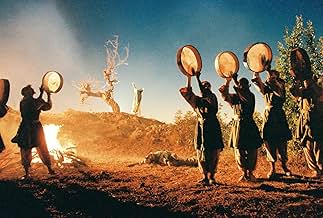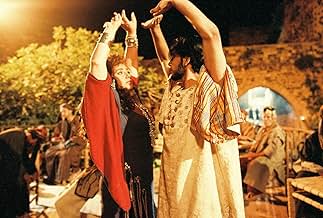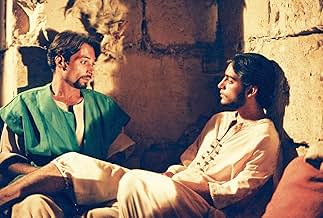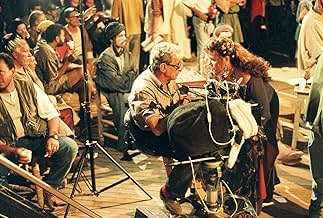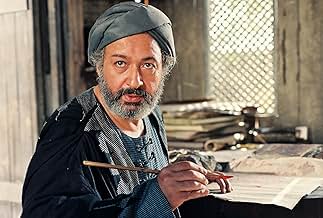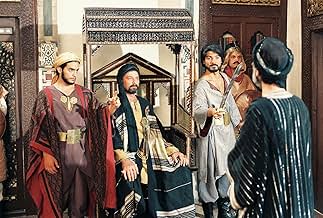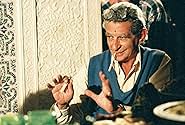Aggiungi una trama nella tua linguaThe story is set in the 12th century in Arab-ruled Spanish province Andalusia, where famed philosopher Averroes is appointed grand judge by the caliph and his liberal court judgments are not... Leggi tuttoThe story is set in the 12th century in Arab-ruled Spanish province Andalusia, where famed philosopher Averroes is appointed grand judge by the caliph and his liberal court judgments are not liked by everyone. The caliph's political rivals, centered around the leader of a fanatic... Leggi tuttoThe story is set in the 12th century in Arab-ruled Spanish province Andalusia, where famed philosopher Averroes is appointed grand judge by the caliph and his liberal court judgments are not liked by everyone. The caliph's political rivals, centered around the leader of a fanatical Islamic sect, force the caliph to send Averroes into exile, but his ideas keep on livin... Leggi tutto
- Regia
- Sceneggiatura
- Star
- Premi
- 2 vittorie e 1 candidatura in totale
- Averroes
- (as Nour El Cherif)
- Al Mansour, The Caliph
- (as Mahmoud Hemeida)
- Averroes' Wife
- (as Safia El Emary)
- Nasser, The Crown Prince
- (as Khaled El Nabaoui)
- The Caliph's Brother
- (as Seif Abdel Rahman)
- Emir of the Sect
- (as Magdi Idris)
- Gaafar
- (as Hasan El-Adl)
Recensioni in evidenza
The story is set in medieval Moorish Spain, about the conflict between Averroes; a historical humanistic Muslim philosopher; and a group of reactionary fundamentalists. It is very well acted and the characters are sympathetic as well as credible. Often forgotten is that many of the Islamic societies of the Early Middle Ages (particularly in Spain) were ahead of Europe in science, mathematics, medicine, religious tolerance and many intellectual pursuits. But, there were periodic and sometimes serious conflicts with those who resented these trends.
This is not just an historical epic. The Egyptian director, a very courageous man named Youssef Chanine, deliberately molded the script to show how fanaticism undermines not only a society's intellect, but destroys it's soul. Particularly disturbing, but highly relevant to our times, is showing the subtle manner in which young men are recruited into these movements and about how empty and dishonest they turn out to be.
Although the population of medieval Andalusia was 10-15% Jewish and Averroes had extensive contact with both Jewish and Christian intellectuals, there isn't a Jew in sight and the only Christians are depicted as evil, fanatical, external enemies who enter into a secret pact with the fundamentalist cult. While this is not entirely accurate and a gross simplification of the actual situation at the time, I don't fault Mr. Chanine. He has endured extreme legal harassment in the Egyptian courts over this and another film as well as extensive death threats against himself and his family. Merely exploring the themes portrayed in this movie has put his head on the chopping block, and any sympathetic depiction of Jews or Christians would have resulted in the banning of the film and possibly his head rolling into the basket. He deliberately crafted this film to educate his own society about the debasement and moral corruption wrought by cultism and violence, and, no doubt, wanted to make sure the message got out.
A bold, and gently provocative film by a very brave man.
The movie has one of the grimmest beginnings I've ever seen. It never gets quite that grim again, but the first few minutes are hard to sit through.
After that, the story is interesting, if hard to understand. The philosopher Averroes was a historical figure. He sometimes lived in North Africa, and sometimes in Andalusia. (Nour El-Sherif is an excellent actor, and he makes us believe in Averroes as a real human being, and not just as a philosopher on a pedestal.)
Averroes translated the works of Aristotle into Arabic, and then he wrote commentaries about them. It's possible that these works would have been lost if Averroes had not undertaken this immense intellectual task.
The basic plot of the story circles around the interaction of Averroes with the Caliph, and the Caliph's brother and sons. I have to admit that I got the sense of who was doing what to whom, but I couldn't always understand the details.
This movie is worth seeing because it's colorful, well-acted, and shows us events about which many of us know very little. It has a solid IMDb rating of 7.3, and I recommend it. It will work better on the large screen.
We were able to see it at Rochester's wonderful Dryden Theatre where it was shown--free--as part of a series entitled Salam. The series is being presented to commemorate the lives of the victims of the atrocities at the Al Noor Mosque and the Linwood Islamic Centre in New Zealand, and in solidarity with Muslim people.
The series was organized by the Eastman Museum in partnership with the Islamic Center of Rochester. I commend both institutions for using artistic works to combat and decry hatred.
Lo sapevi?
- QuizAccording to an interview actor Nour El-Sherif stated that the role of Ibn Roshd was supposed to be played by director Youssef Chahine himself, but Nour told him that he was not suitable for the role.
- Citazioni
Caliph's brother: Thoughts have wings. No one can prevent them from flying.
- ConnessioniFeatured in Humbert Balsan, producteur rebelle (2006)
- Colonne sonoreAlli sotak
and "Gamr el Hawa", words by Sameh El Kodoussi and Kawssar Mostapha, music by Kamal El Tawil
Performed by Mohamed Mounir
I più visti
- How long is Destiny?Powered by Alexa
Dettagli
- Data di uscita
- Paesi di origine
- Lingue
- Celebre anche come
- Destiny
- Luoghi delle riprese
- Krak des Chevaliers, Syria(sect training grounds)
- Aziende produttrici
- Vedi altri crediti dell’azienda su IMDbPro
Contribuisci a questa pagina


